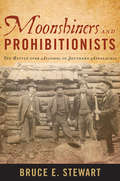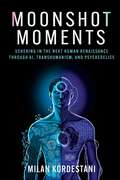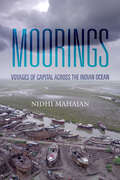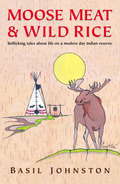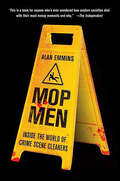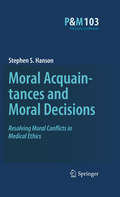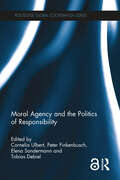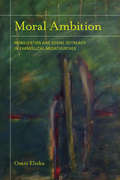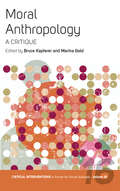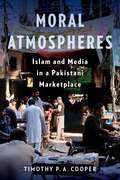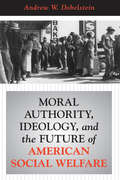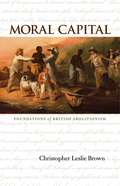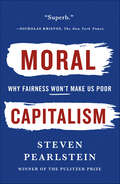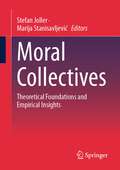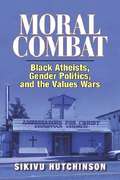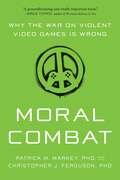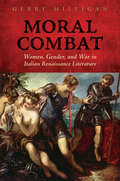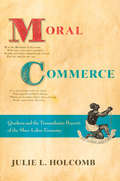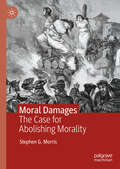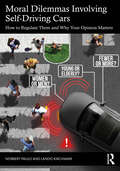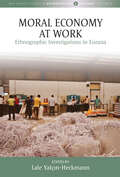- Table View
- List View
Moonshiners and Prohibitionists: The Battle over Alcohol in Southern Appalachia (New Directions in Southern History)
by Bruce E. StewartA &“masterly study&” of how the business of homemade liquor shaped the history and culture of a region (Journal of American History). Homemade liquor has played a prominent role in the Appalachian economy for nearly two centuries. The region endured profound transformations during the extreme prohibition movements of the nineteenth century, when the manufacturing and sale of alcohol—an integral part of daily life for many Appalachians—was banned.Moonshiners and Prohibitionists: The Battle over Alcohol in Southern Appalachia chronicles the social tensions that accompanied the region&’s early transition from a rural to an urban-industrial economy. It analyzes the dynamic relationship of the bootleggers and opponents of liquor sales in western North Carolina, as well as conflict driven by social and economic development that manifested in political discord—and also explores the life of the moonshiner and the many myths that developed around hillbilly stereotypes. &“A much-needed contribution to our understanding of the complex social, economic, religious, and cultural issues underlying the prohibition impulse that swept the South between 1880 and 1920.&” ―Journal of Southern History
Moonshot Moments: Ushering in the Next Human Renaissance Through AI, Transhumanism, and Psychedelics
by Milan KordestaniWhile humanity faces unprecedented ecological and social challenges, advances in technology and our understanding of the mind are creating the conditions for a global renaissance. Weaving together personal transformation through transhumanism with a call for global collaboration, author Milan Kordestani presents an inspiring roadmap to a brighter future.Humanity stands at a crossroads. Technological development outpaces our confidence, with each innovation bringing both wonder and unease. We grapple with the fear of the unknown and the anxieties of a rapidly changing world. We wonder if new technologies will decimate our job market, increase inequality, or endanger our species. But what if the key to unlocking our full potential lies not in clinging to the familiar, but in embracing humanity&’s potential for radical thinking? Moonshot Moments is a marriage of science, philosophy, history, and futurism. Bestselling author Milan Kordestani chronicles his journey to thrilling and unforeseen frontiers in our understanding of consciousness, the self, and humanity&’s cosmic destiny. His exploration moves beyond the growing anxiety over rapid AI development to offer a unifying, transhumanist vision for the future of humankind. He delves into the biohacking of human consciousness, exploring how, amid a world offering both suffering and joy, we can cultivate presence and discover meaning in our lives. Readers will discover how to organize their own mindsets and work toward a collaborative community that is fueled by innovation, building a society that will spark solutions to tomorrow&’s challenges. Moonshot Moments is not just a glimpse into a brighter future, it's a blueprint for actively creating it.
Moorings: Voyages of Capital across the Indian Ocean
by Nidhi MahajanA free ebook version of this title is available through Luminos, University of California Press's Open Access publishing program. Visit www.luminosoa.org to learn more.Moorings follows sailors from the Gulf of Kachchh in India as they voyage across the Indian Ocean on mechanized wooden sailing vessels known as vahans, or dhows. These voyages produce capital through moorings that are spatial, moral, material, and conceptual. With a view from the dhow, the book examines the social worlds of Muslim seafarers who have been rendered invisible even as they maneuver multiple regulatory regimes and the exigencies of life, navigating colonialism, neoliberalism, the rise of Hindutva, insurgency, climate change, and border regimes across the ocean. Based on historical and ethnographic research aboard ships, at ports, and in religious shrines and homes, Moorings shows how capitalism derives value from historically sedimented practices grounded in caste, gender, and transregional community-based forms of regulation.
Moorish Poetry: A Translation of The Pennants, and Anthology Compiled in 1243 by the Andalusian Ibn Sa'id
by AndalusianSeven hundred and fifty years ago, this anthology of small masterpieces of renowned Moorish poets from Muslim Spain, North Africa and Sicily was compiled by Ibn Sa'id al-Andalusi, a native of Southern Spain. The text has been translated into rhymed English verses with an Introduction explaining the conventions of Arabic literature within which these Moorish poets worked.
Moose Meat & Wild Rice
by Basil JohnstonMoose Meat and Wild Rice is a unique comic collection by one of Canada's first and most successful Aboriginal authors, who turns his talents to a mischievous (but never malicious) depiction of Ojibway and Ojibway-White relations, with the gentle satire cutting both ways. Light, but nevertheless realistic, told as fiction but based in fact, the escapades undertaken by the populace of Moose Meat Point Reserve encompass havoc and hilarity, prejudice and pretence.
Moose to Moccasins: The Story of Ka Kita Wa Pa No Kwe
by Madeline Katt TheriaultHaving been born in a tent on Bear Island, Lake Temagami, in 1908, Madeline Katt Theriault could recall an earlier independent and traditional First Nations lifestyle. In this book, the late author proudly tells of her youth and coming of age by sharing her vivid memories and drawing on exceptional old family photographs. In her own words, she writes of a time long ago – a time that was difficult, but not without personal rewards. "Moose to Moccasins is a remarkable account by Madeline Theriault, or Ka Kita Wa Pa No Kwe (’Wise Day Woman’), who, in her own words, has lived ’in both cultures, Indian and white man’s.’ From her birth in the Temagami region in 1908, to her life in North Bay in the 1970s and 1980s, she takes the reader on a remarkable journey. We travel through the bush with her as a young girl. ’We killed animals only when needed and we could drink water anywhere. Our camp was always fresh; fresh balsam branches for our beds and floors in the camp. Such lively smells and the air was pure.’ We step back into another century, into another universe. There is a wealth of information in these pages about a people, and a way of life, about which most non-Natives know almost nothing." – Donald B. Smith, Professor of History, University of Calgary
Mop Men: Inside the World of Crime Scene Cleaners
by Alan EmminsNeal Smither doesn't hide his work. The side of his van reads: "Crime Scene Cleaners: Homicides, Suicides and Accidental Death." Whenever a hotel guest permanently checks out, the cops finish an investigation, or an accidental death is reported, Smither's crew pick up the pieces after the police cruisers and ambulances have left. Alan Emmins offers a glimpse at this little-known aspect of America's most gruesome deaths. Filled with details as fascinating as they are gory, Mop Men examines not just the public fascination with murder but also how a self-made success like Smither can make a fortune just by praying for death.
Moral Acquaintances and Moral Decisions
by Stephen S. HansonThe potential of modern medicine in a pluralistic world leads to the potential for moral conflict. The most prevalent bioethical theories often either overestimate or underestimate the amount of shared moral belief that can be used to address those conflicts. This work presents a means for taking seriously the pluralism in the modern world while recognizing the likelihood of moral "acquaintance" between persons with differing views. It criticizes moral theories that overstate the extent of the problem of pluralism as well as those that imply too much agreement between reasonable moral persons, yet it locates a means for the resolution of many moral conflicts in moral acquaintanceship. Drawing from the work of H. Tristram Engelhardt, Jr., casuists and principle-based theorists, and Erich Loewy and Kevin W. Wildes's initial development of the concept of moral acquaintanceship, Moral Acquaintances and Moral Decisions is philosophically indepth work with direct applications for decisionmaking in real medical settings. A work in moral theory as well as a source of real world guidance, clinically oriented bioethics professionals as well as students of bioethical theory should find the theory of moral acquaintanceship provided here important to their work.
Moral Agency and the Politics of Responsibility (ISSN)
by Peter Finkenbusch Tobias Debiel Cornelia Ulbert Elena SondermannAt a time when globalization has side-lined many of the traditional, state-based addressees of legal accountability, it is not clear yet how blame is allocated and contested in the new, highly differentiated, multi-actor governance arrangements of the global economy and world society. Moral Agency and the Politics of Responsibility investigates how actors in complex governance arrangements assign responsibilities to order the world and negotiate who is responsible for what and how.The book asks how moral duties can be defined beyond the territorial and legal confines of the nation-state; and how obligations and accountability mechanisms for a post-national world, in which responsibility remains vague, ambiguous and contested, can be established. Using an empirical as well as a theoretical perspective, the book explores ontological framings of complexity emphasizing emergence and non-linearity, which challenge classic liberal notions of responsibility and moral agency based on the autonomous subject. Moral Agency and the Politics of Responsibility is perfect for scholars from International Relations, Politics, Philosophy and Political Economy with an interest in the topical and increasingly popular topics of moral agency and complexity.The Open Access version of this book, available at http://www.taylorfrancis.com, has been made available under a Creative Commons Attribution-Non Commercial-No Derivatives (CC-BY-ND) 4.0 license.
Moral Agency and the Politics of Responsibility (Routledge Global Cooperation Series)
by Peter Finkenbusch Tobias Debiel Cornelia Ulbert Elena SondermannAt a time when globalization has side-lined many of the traditional, state-based addressees of legal accountability, it is not clear yet how blame is allocated and contested in the new, highly differentiated, multi-actor governance arrangements of the global economy and world society. Moral Agency and the Politics of Responsibility investigates how actors in complex governance arrangements assign responsibilities to order the world and negotiate who is responsible for what and how. The book asks how moral duties can be defined beyond the territorial and legal confines of the nation-state; and how obligations and accountability mechanisms for a post-national world, in which responsibility remains vague, ambiguous and contested, can be established. Using an empirical as well as a theoretical perspective, the book explores ontological framings of complexity emphasizing emergence and non-linearity, which challenge classic liberal notions of responsibility and moral agency based on the autonomous subject. Moral Agency and the Politics of Responsibility is perfect for scholars from International Relations, Politics, Philosophy and Political Economy with an interest in the topical and increasingly popular topics of moral agency and complexity.
Moral Ambition: Mobilization and Social Outreach in Evangelical Megachurches
by Omri ElishaIn this evocative ethnography, Omri Elisha examines the hopes, frustrations, and activist strategies of American evangelical Christians as they engage socially with local communities. Focusing on two Tennessee megachurches, Moral Ambition reaches beyond political controversies over issues such as abortion, same-sex marriage, and public prayer to highlight the ways that evangelicals at the grassroots of the Christian Right promote faith-based causes intended to improve the state of social welfare. The book shows how these ministries both help churchgoers embody religious virtues and create provocative new opportunities for evangelism on a public scale. Elisha challenges conventional views of U.S. evangelicalism as narrowly individualistic, elucidating instead the inherent contradictions that activists face in their efforts to reconcile religious conservatism with a renewed interest in compassion, poverty, racial justice, and urban revivalism.
Moral Anthropology: A Critique (Critical Interventions: A Forum for Social Analysis #16)
by Bruce Kapferer Marina GoldA development in anthropological theory, characterized as the 'moral turn', is gaining popularity and should be carefully considered. In examining the context, arguments, and discourse that surrounds this trend, this volume reconceptualizes the discipline of anthropology in a radical way. Contributions from anthropologists from around the world from different theoretical traditions and with expertise in a multiplicity of ethnographic areas makes this collection a provocative contribution to larger discussions not only in anthropology but the social sciences more broadly.
Moral Atmospheres: Islam and Media in a Pakistani Marketplace (Religion, Culture, and Public Life #51)
by Timothy P. CooperLahore’s Hall Road is the largest electronics market in Pakistan. Once the center of film and media piracy in South Asia, it now specializes in smartphones and accessories. For Hall Road’s traders, conflicts between the economic promises and the moral dangers of film loom large. To reconcile their secular trade with their responsibilities as devoted Muslims, they often look to adjudicate the good or bad moral “atmosphere” (mahaul) that can cling to film and media.Timothy P. A. Cooper examines the diverse and coexisting moral atmospheres that surround media in Pakistan, tracing public understandings of ethical life and showing how they influence economic behavior. Drawing on extensive ethnographic work among traders, consumers, collectors, archivists, cinephiles, and cinephobes, Moral Atmospheres explores varied views on what the relationship between film and faith should look, sound, and feel like for Pakistan’s Muslim-majority public. Cooper considers the preservation and censorship of film in and outside of the state bureaucracy, contestations surrounding heritage and urban infrastructure, and the production and circulation of sound and video recordings among the country’s religious minorities. He argues that a focus on atmosphere provides ways of seeing moral thresholds as mutable and affective, rather than as fixed ethical standpoints. At once a vivid ethnography of a market street and a generative theorization of atmosphere, this book offers fresh perspectives on moral experience and the relationship between religion and media.
Moral Authority, Ideology, And The Future Of American Social Welfare
by Andrew W. DobelsteinThis book departs from standard presentations of social welfare by dealing directly with the ideologies that have shaped the American experience and illustrates how the values these ideologies generate define the framework of American social welfare through existing economic, governmental, and social structures. }American welfare policies and programs frustrate both conservative and liberal advocates who fail to realize that American welfare policy cannot be any more than, or any less than, the distinctly American framework in which it operates. Moral Authority, Ideology, and the Future of American Social Welfare departs from standard presentations of social welfare by dealing directly with the ideologies that have shaped the American experience and illustrates how the values these ideologies generate define the framework of American social welfare through existing economic, governmental, and social structures. By reviewing the ideological frameworks that have shaped the American experience, Andrew Dobelstein explains that we have tried to do much more with American social welfare policy than is possible in the present American system and that prudence suggests a reformation of American social welfare policywhich is not to do less but to do what we are capable of doing in a more effective way. This book suggests how welfare can be re-formed by taking the American ideological context as a road map for which welfare changes are possible and which are not, laying out a framework for welfare as America enters the twenty-first century. }
Moral Capital
by Christopher Leslie BrownRevisiting the origins of the British antislavery movement of the late eighteenth century, Christopher Leslie Brown challenges prevailing scholarly arguments that locate the roots of abolitionism in economic determinism or bourgeois humanitarianism. Brown instead connects the shift from sentiment to action to changing views of empire and nation in Britain at the time, particularly the anxieties and dislocations spurred by the American Revolution. The debate over the political rights of the North American colonies pushed slavery to the fore, Brown argues, giving antislavery organizing the moral legitimacy in Britain it had never had before. The first emancipation schemes were dependent on efforts to strengthen the role of the imperial state in an era of weakening overseas authority. By looking at the initial public contest over slavery, Brown connects disparate strands of the British Atlantic world and brings into focus shifting developments in British identity, attitudes toward Africa, definitions of imperial mission, the rise of Anglican evangelicalism, and Quaker activism.Demonstrating how challenges to the slave system could serve as a mark of virtue rather than evidence of eccentricity, Brown shows that the abolitionist movement derived its power from a profound yearning for moral worth in the aftermath of defeat and American independence. Thus abolitionism proved to be a cause for the abolitionists themselves as much as for enslaved Africans.
Moral Capitalism: Why Fairness Won't Make Us Poor
by Steven PearlsteinThe Pulitzer Prize–winning economics journalist explains how America’s capitalist system is broken and how it can be repaired.With a new introduction by the authorThirty years ago, “greed is good” and “maximizing shareholder value” became the new mantras woven into the fabric of our economy, politics, and business culture. Free market capitalism has lifted more than a billion people from poverty around the world. But in the United States, most of its benefits have been captured by the richest ten percent, and it has provided justification for squeezing workers, cheating customers, avoiding taxes, and leaving communities in the lurch. As a result, Americans are losing faith in the free market—and the democratic institutions that support it.In Moral Capitalism, Pulitzer Prize–winning journalist Steven Pearlstein chronicles our descent and challenges the theories being taught in business schools and exercised in boardrooms nationwide. Missing from our current model are vital elements recognized long ago by Adam Smith and Charles Darwin—the mutual trust and cooperation necessary for capitalism to survive and thrive. Pearlstein shows how rising inequality of incomes and opportunity have eroded that social capital, and how restoring fairness need not come at the expense of economic growth. He concludes with bold steps to create a shared prosperity and revive our faith in American capitalism.Previously published as Can American Capitalism Survive?Praise for Moral Capitalism“If anyone can save capitalism from the capitalists, it’s Steven Pearlstein. This lucid, brilliant book refuses to abandon capitalism to those who believe morality and justice irrelevant to an economic system.” —Ezra Klein, founder and editor-at-large, Vox“This book delivers a trenchant critique of the ravages of inequality and a passionate cry for greater balance. [A] powerful, idealistic book.” —The Washington Post
Moral Certainty and the Foundations of Morality
by Neil O’HaraWhat lies at the foundation of our moral beliefs? If we dig down far enough do we find that our moral values have no ground at all to stand on, and so are apt to collapse upon serious philosophical investigation? This book seeks to answer these and related questions by positing an indubitable foundation for our moral beliefs – they arise from the phenomenon of ‘primary recognition’, and are fundamentally shaped by ‘basic moral certainties’. Drawing on philosophers such as Ludwig Wittgenstein and Knud Ejler Løgstrup, this book draws together insights from both Analytic and Continental philosophy to provide a convincing new picture of our moral foundations. And it does so in a way that eschews moral conservativism and opens the way for a rich understanding of the variety and particularity of our human moral systems, while also keeping a significant place for those moral beliefs that occur universally, across cultures.
Moral Collectives: Theoretical Foundations and Empirical Insights
by Stefan Joller Marija StanisavljevićWhether terrorist attacks, refugee or financial crises - the challenges of globalized modernity expose those areas that Durkheim described as anomic and whose processing still illustrates the central position of moral communication. There is some evidence to suggest that progressive functional differentiation does not erode morality, but actually promotes a remoralization of society through increasing communicative networking. Wherever grievances come to light and it is not foreseeable how they could be satisfactorily resolved in the modus operandi, morality provides a promising instrument which, in the form of moral collectives, is able to permeate everyday life and shape society. In this sense, the anthology is dedicated to a theoretical as well as empirical analysis of morality, which takes shape as a genuinely social quantity via moral collectives. This book is a translation of an original German edition. The translation was done with the help of artificial intelligence (machine translation by the service DeepL.com). A subsequent human revision was done primarily in terms of content, so that the book will read stylistically differently from a conventional translation.
Moral Combat: Black Atheists, Gender Politics, and the Values Wars
by Sikivu HutchinsonThe word atheism elicits shock, dread, anger, and revulsion among most African Americans. They view atheism as “amoral,” heresy, and race betrayal. Historically, the Black Church was a leading force in the fight for racial justice. Today, many black religious leaders have aligned themselves with the Religious Right. While black communities suffer economically, the Black Church is socially conservative on women’s rights, abortion, same sex marriage, and church/state separation. These religious “values wars” have further solidified institutional sexism and homophobia in black communities. Yet, drawing on a rich tradition of African American free thought, a growing number of progressive African American non-believers are openly questioning black religious and social orthodoxies. Moral Combat provides a provocative analysis of the political and religious battle for America’s soul. It examines the hijacking of civil rights by Christian fascism; the humanist imperative of feminism and social justice; the connection between K-12 education and humanism; and the insidious backlash of Tea Party-style religious fundamentalism against progressive social welfare public policy. Moral Combat also reveals how atheists of color are challenging the whiteness of “New Atheism” and its singular emphasis on science at the expense of social and economic justice. In Moral Combat, Sikivu Hutchinson highlights the cultural influence of African American humanist and atheist social thought in America. She places this tradition within the broader context of public morality and offers a far-reaching vision for critically conscious humanism
Moral Combat: Why the War on Violent Video Games Is Wrong
by Christopher J. Ferguson Patrick M. MarkeyIn family rooms across America, millions of children and teenagers are playing video games, such as Call of Duty, Halo, and Grand Theft Auto, roaming violent virtual worlds—with virtual guns in their hands. In what sometimes seems like an increasingly violent world, it's only natural to worry about the effects of all this pixelated gore. But is that concern misplaced? Authors and psychologists Patrick M. Markey and Christopher J. Ferguson say it is. The media and politicians have been sounding the alarm for years, and with every fresh tragedy involving a young perpetrator comes another flurry of articles about the dangers of violent media. The problem is this: Their fear isn't supported by the evidence. In fact, unlike the video game–trained murder machines depicted in the press, school shooters are actually less likely to be interested in violent games than their peers. In reality, most well-adjusted children and teenagers play violent video games, all without ever exhibiting violent behavior in real life. What's more, spikes in sales of violent games actually correspond to decreased rates of violent crime. If that surprises you, you're not alone—the national dialogue on games and violence has been hopelessly biased. But that's beginning to change. Scholars are finding that not only are violent games not one of society's great evils, they may even be a force for good. In Moral Combat, Markey and Ferguson explore how video games—even the bloodiest—can have a positive impact on everything from social skills to stress, and may even make us more morally sensitive. Tracing the rise of violent games from arcades to online deathmatches, they have spent years on the front lines of the video game debate and now offer a comprehensive overview of the scientific research on gaming. With humor, complete honesty, and extensive research, they separate the myth from the medium. Moral Combat is an irreverent and informative guide to the worries—and wonders—of our violent virtual world.
Moral Combat: Women, Gender, and War in Italian Renaissance Literature (Toronto Italian Studies)
by Gerry MilliganThe Italian sixteenth century offers the first sustained discussion of women’s militarism since antiquity. Across a variety of genres, male and female writers raised questions about women’s right and ability to fight in combat. Treatise literature engaged scientific, religious, and cultural discourses about women’s virtues, while epic poetry and biographical literature famously featured examples of women as soldiers, commanders, observers, and victims of war. Moral Combat asks how and why women’s militarism became one of the central discourses of this age. Gerry Milligan discusses the armed heroines of biography and epic within the context of contemporary debates over women’s combat abilities and men’s martial obligations. Women are frequently described as fighting because men have failed their masculine duty. A woman’s prowess at arms was asserted to be a cultural symptom of men’s shortcomings. Moral Combat ultimately argues that the popularity of the warrior woman in sixteenth-century Italian literature was due to her dual function of shame and praise: calling men to action and signaling potential victory to a disempowered people.
Moral Commerce: Quakers and the Transatlantic Boycott of the Slave Labor Economy
by Julie L. HolcombHow can the simple choice of a men's suit be a moral statement and a political act? When the suit is made of free-labor wool rather than slave-grown cotton. In Moral Commerce, Julie L. Holcomb traces the genealogy of the boycott of slave labor from its seventeenth-century Quaker origins through its late nineteenth-century decline. In their failures and in their successes, in their resilience and their persistence, antislavery consumers help us understand the possibilities and the limitations of moral commerce.Quaker antislavery rhetoric began with protests against the slave trade before expanding to include boycotts of the use and products of slave labor. For more than one hundred years, British and American abolitionists highlighted consumers’ complicity in sustaining slavery. The boycott of slave labor was the first consumer movement to transcend the boundaries of nation, gender, and race in an effort by reformers to change the conditions of production. The movement attracted a broad cross-section of abolitionists: conservative and radical, Quaker and non-Quaker, male and female, white and black.The men and women who boycotted slave labor created diverse, biracial networks that worked to reorganize the transatlantic economy on an ethical basis. Even when they acted locally, supporters embraced a global vision, mobilizing the boycott as a powerful force that could transform the marketplace. For supporters of the boycott, the abolition of slavery was a step toward a broader goal of a just and humane economy. The boycott failed to overcome the power structures that kept slave labor in place; nonetheless, the movement’s historic successes and failures have important implications for modern consumers.
Moral Damages: The Case for Abolishing Morality
by Stephen G. MorrisDespite the wide-ranging differences in people’s moral perspectives, there is near universal agreement that the world is generally better off when people allow morality to dictate their actions. But what if this view is wrong? What if the very thing that most people think is key to improving human relations is actually a primary contributor to unnecessary suffering and strife? In this book, Stephen G. Morris uses the latest empirical evidence to argue that eliminating all vestiges of morality from our lives (a position known as moral abolitionism) would likely yield benefits on both an individual and a societal level. Though the primary aim is to build a pragmatic case for why we ought to dispense with morality, Morris first argues that there are theoretical reasons for rejecting morality since we lack compelling arguments for the existence of moral facts. From there, he cites extensive evidence suggesting that morality does more harm than good through its negative influence on violence, politics, and personal relationships. Following a discussion of how we have at our disposal the necessary resources (i.e., empathy, prudential self-interest, and reason) to benefit humanity in a world without morality, Morris concludes by offering some specific steps societies could take to help eliminate morality’s corrupting influence and to improve human relations.
Moral Dilemmas Involving Self-Driving Cars: How to Regulate Them and Why Your Opinion Matters
by Norbert Paulo Lando KirchmairExperts believe that self-driving cars will be much safer than conventional cars. However, there will still be some accidents, even fatal ones. The innovation of self-driving cars gives us the new, amazing, and, at the same time, arduous opportunity to decide in advance what should happen in which accident situation. It will force us to decide who must die in order to save others in dilemma situations.This book prepares readers to take an informed stance on the difficult moral dilemmas involving self-driving cars. It will convince them that the ethical and legal challenges posed by self-driving cars are real, novel, and unavoidable—and that they require a solution. It presents the problems involved in programming self-driving cars for dilemma situations, putting the reader in the position to develop their own well-informed opinion on the issues. The book also discusses the astonishing discrepancies between existing regulations for collisions involving self-driving cars in some jurisdictions and empirical findings about what people think about how they should be regulated. Finally, it presents advice for policymakers around the globe on how to regulate moral dilemmas involving self-driving cars.Moral Dilemmas Involving Self-Driving Cars will be of interest to a broad range of students, scholars, and policymakers interested in the ethics of self-driving vehicles.
Moral Economy at Work: Ethnographic Investigations in Eurasia (Max Planck Studies in Anthropology and Economy #8)
by Lale Yalçın-HeckmannThe idea of a moral economy has been explored and assessed in numerous disciplines. The anthropological studies in this volume provide a new perspective to this idea by showing how the relations of workers, employees and employers, and of firms, families and households are interwoven with local notions of moralities. From concepts of individual autonomy, kinship obligations, to ways of expressing mutuality or creativity, moral values exert an unrealized influence, and these often produce more consent than resistance or outrage.
